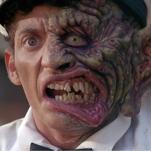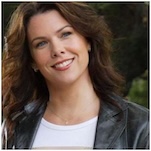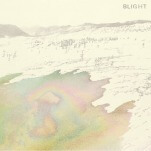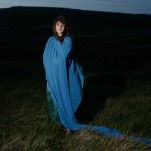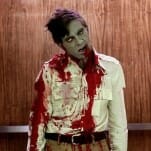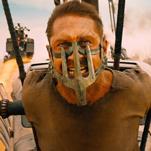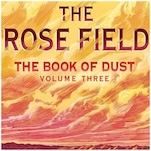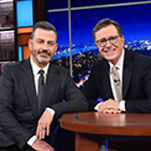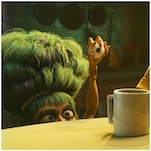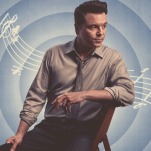Steven Universe Shows Us Humans Reduced to Teletubbies in “The Zoo”
(Episode 4.14)
Cartoon Network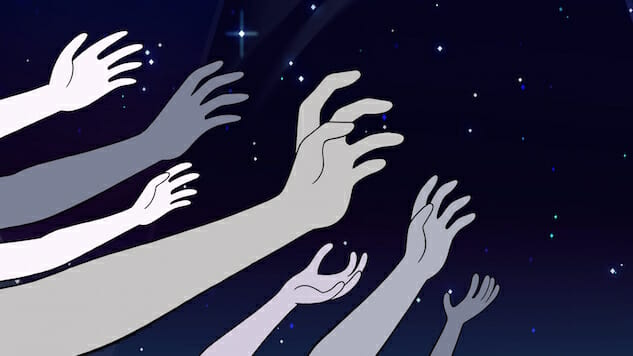
When I was a kindergartener in the late ’90s, my favorite show on television was Teletubbies. It wasn’t so much that I enjoyed listening to their infantile babbling or took particular pleasure in the asinine videos that would appear on the lucky one’s stomach in each episode (always to be repeated; “AGAIN AGAIN,” they would cry). Even at that young age, I think I understood how patently absurd the Teletubbies were. Rather, I was most thrilled by my mom’s visceral reaction of annoyance every time the sun-baby rose and Tinky-Winky, Dipsi, La La and Po ran to greet viewers with an earsplitting “Eh oh!”
So you can understand the flashbacks I was having when Steven Universe gave us humans guided through their day by a voice, doing nothing more with their time than eating food conjured from thin air and rolling down a hill for fun.
I think I finally understand why the Teletubbies drove my mom nuts, because witnessing the adult denizens of Pink Diamond’s Zoo dispossessed of their rational functionality made me cringe. But eliciting that reaction is the point of “The Zoo.” We see humans in dystopian societies all the time in entertainment, but this darkly dreaming episode asks a slightly different question: What would humans look like if they were domesticated by some higher species?
Domesticated Humans Cannot Survive in the Wild
Domestication, of course, is responsible not only for our ability to keep dogs and cats as pets, but also for our ability to ride horses, milk cows and herd sheep. It’s the result of generations of selective breeding to favor various traits that made these animals useful to us: friendliness, docility, ability to respond to commands. Such animals cannot survive long in the wild, because artificial selection has replaced the rule of Darwin and made these creatures physical and mental shadows of their wild ancestors. For a very science-heavy explanation of the mechanics of “domestication syndrome,” as it’s called, check out this article from the journal Genetics.
Domesticating a human should be difficult, because we possess self-consciousness, memory and executive functioning skills that allow us at least the illusion of agency. Doubtless, the original inhabitants of the Zoo behaved as Greg (Tom Scharpling) does, attempting to escape. But we see how quickly Greg’s own resistance is worn down in the face of the Zoo’s creature comforts: perfect temperature, plentiful food, no obligations or need to think about an uncertain future—or the fraught past. If Greg shows such signs of docility and domestication after one day in the Zoo, we can only imagine how quickly the first generation allowed its collective mind to bask in the nymphal fountain and bake in the artificial sunlight. 5,000 years later, not only do their descendants look different from other humans (note their vivid green eyes and the proliferation of cat-like upper lips), they also have no mythology or culture of any kind. It’s telling that the only story we hear from their past is one in which the legend of “hurt” was established; without any misfortune or hardship, they possess no drive to explain the world around them, or to think up superpowered beings who could save them, or to imagine any possible alternative worlds. In short, the light of aspiration was extinguished in their civilization long ago… and with nothing to plan for, their rational capacity has been dulled almost beyond recognition, or at least to the level of a Teletubby’s.
In this process, Steven Universe promulgates its own conception of human nature: Give us everything we could ever want, and we will be sedated. I’m not sure I buy it, though, because that wouldn’t account for the one factor that could destroy the Zoo’s utopian state: Its inhabitants’ sex drive, a phenomenon that exists even in domesticated dogs and cats. All it would take would be for one member of their tribe to act upon instinct, refuse the Choosening and seize the most physically attractive member of the opposite sex. That said, the suspicious-looking earrings from which the captives’ “little voice” emanates might contain some sort of testosterone suppressant—in fact, this would explain why some of the Zoo’s men appear somewhat androgynous.
But enough biological guesswork… Let’s get to the philosophical meat of the issue.
Which Is the Curse: Happiness or Consciousness?
In one of the more important lines of “The Zoo,” Steven (Zach Callison) exclaims, “I know what hurt is!” His life on Earth abounds with hurt, not just in his own soul but in those of his friends and family, whose pain he shares because of his tacit empathy superpower. The series itself is built around the death of Rose Quartz; even in the ancient, light-hearted episodes of its first season, Steven Universe espoused the maxim that hurt is integral to life on this planet. Over the show’s course, we’ve seen various healthy and unhealthy ways to respond to it. The people of the Zoo, though, have no idea how to respond when Greg breaks their hearts. They sob like toddlers; no part of their brains is equipped to handle even a trivial trauma.
This is only a fraction of the pain that would have resulted if Steven tried to convince the Zoo’s inhabitants that they were trapped. Would it have been worth it? Steven concludes that the best option is to leave the Zoo-people be, full of untapped potential for consciousness and aspiration but also full of sheer joy. But the only reason he was able to consider multiple options is that he already possesses consciousness. That is to say, Steven could perceive the unbelievable happiness of the Zoo-people, but they could not perceive the expanded mental capabilities he’s developed in a highly imperfect world. So we come to the eternal question: Is consciousness the real curse? And if so, are we committing a moral violation if we bestow it upon others?
Most of us can’t choose not to be conscious, because we exist in a world where pain exists, and pain is the great awakener. Once the seed of consciousness has bloomed within us, as it bloomed within Steven when he freed Lapis Lazuli from her mirror, the dissatisfaction it breeds leads us on a journey to find answers, purpose or both. But choosing to undertake our own growth is quite different from awakening someone else’s, and Steven takes the position that the right thing to do is to let them slumber… which, when juxtaposed with the truth-seeking odyssey that kicked off this run of SU episodes, makes our hero appear more tragic. There’s a terrific mix of emotions bundled within Steven’s sigh of resignation to leave the Zoo-people in their state of bliss: the regret that he would be doing harm by saving them, yes, but also the weary wisdom of knowing that he cannot join them. He is well aware of his cursed consciousness, but he realizes that a fully human state of being involves embracing that curse.
After “Adventures in Light Distortion,” I was afraid that Steven would follow this mission by shrinking from further investigations into the truth, but it seems that seeing the human Teletubbies of the Zoo has awakened him to that impossibility. Steven’s own path to happiness will be forged the hard way—facing down the extraordinary pain of the past and the brutal realities of the present—and when (or if) he finally reaches a position of serenity, it will be far more fulfilling than that of the Platonic cave-dwellers he’s just escaped.
The Bits
“The bits! The bits!”
Giving Greg the crown of flowers was a nice touch to show that his elevated level of being is vaguely obvious, even to the Zoo-people.
I was bothered again by the universal language of the show. Can’t help but feel like they could’ve gotten more creative with nonverbal communication and interpretation.
It sometimes gets lost in the shadow of his other powers, but damn, Steven is strong.
The next time I host an outdoor party, I’m going to tell everyone to reach as high as they can toward the sky, then insist that it was fun.
Zach Blumenfeld wanted to quote Dostoyevsky in this review, but even thinking about that Russian sadsack made him anxious. Follow Zach on Twitter.






















